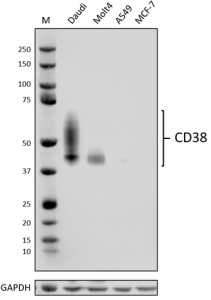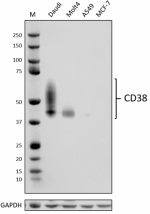- Clone
- W22190F (See other available formats)
- Regulatory Status
- RUO
- Other Names
- cluster of differentiation 38 (CD38), ADP-ribosyl cyclase/cyclic ADP-ribose hydrolase 1 (ADPRC1/cADPR hydrolase 1), 2'-phospho-ADP-ribosyl cyclase/2'-phospho-cyclic-ADP-ribose transferase
- Isotype
- Rat IgG2a, κ
- Ave. Rating
- Submit a Review
- Product Citations
- publications

-

Whole cell extracts (15 µg total protein) from indicated cell lines were resolved by 4-12% Bis-Tris gel electrophoresis, transferred to a PVDF membrane, and probed with 0.25 µg/mL of Purified anti-CD38 (clone W22190F) overnight at 4°C. Proteins were visualized by chemiluminescence detection using HRP Goat anti-rat IgG (Cat. No. 405405). Direct-Blot™ HRP anti-GAPDH (Cat. No. 607903) was used as a loading control at a 1:50000 dilution. Western-Ready™ ECL Substrate Premium Kit (Cat. No. 426319) was used as a detection agent. Lane M: Molecular weight marker -

IHC staining of Purified anti-CD38 (clone W22190F) on formalin-fixed paraffin-embedded human tonsil tissue. Following antigen retrieval using Tris-EDTA (10 mM Tris, 1 mM EDTA, 0.05% Tween-20, pH 9.0), the tissue was incubated without (panel A) and with (panel B) 10 µg/mL of Purified anti-CD38 (clone W22190F) followed by incubation with Alexa Fluor® 647 Goat anti-rat IgG (Cat. No. 405416) for 1 hour at room temperature. Nuclei were counterstained with DAPI (Cat. No. 422801). Images were captured with a 40X objective. Scale bar: 50 µm -

MCF-7 cells (negative cell line, panel A) and Daudi cells (positive cell line, panel B) were fixed and permeabilized with 100% ice-cold methanol for 10 minutes and blocked with 5% FBS for 1 hour at room temperature. Cells were then stained with 1.0 µg/mL of Purified anti-CD38 (clone W22190F), followed by incubation with Alexa Fluor® 594 Goat anti-rat IgG (Cat. No. 405422) for 1 hour at room temperature. Nuclei were counterstained with DAPI (Cat. No. 422801). The images were captured on a Revvity Operetta CLS™ High Content Analysis System with a 63X objective. Scale bar: 50 µm
| Cat # | Size | Price | Quantity Check Availability | Save | ||
|---|---|---|---|---|---|---|
| 632351 | 25 µg | 170 CHF | ||||
| 632352 | 100 µg | 455 CHF | ||||
CD38 is a widely-expressed, multifunctional protein whose role is best studied in the immune system, where it is expressed at varying levels in multiple immune cell types including lymphocytes, monocytes/macrophages, dendritic cells and NK cells. CD38 functions in cell signaling via protein-protein interactions with cell membrane proteins in other immune cell types. For example, CD38 interacts with the T cell receptor complex in T cells and the B cell co-receptor complex in B cells. CD38 also binds to CD31/PECAM in blood vessels to mediate lymphocyte adhesion. Additionally, CD38 has intrinsic enzymatic activity, catalyzing the synthesis of ADP ribose, cyclic ADP ribose, or nicotinamide from NAD. Due to the influence the synthesized molecules have on calcium dynamics, CD38 plays a role in diverse physiological processes, including regulating insulin secretion and modulation of neurotransmitter release.
Product DetailsProduct Details
- Verified Reactivity
- Human
- Antibody Type
- Monoclonal
- Host Species
- Rat
- Immunogen
- Recombinant fragment of human CD38
- Formulation
- Phosphate-buffered solution, pH 7.2, containing 0.09% sodium azide
- Preparation
- The antibody was purified by affinity chromatography.
- Concentration
- 0.5 mg/mL
- Storage & Handling
- The antibody solution should be stored undiluted between 2°C and 8°C.
- Application
-
WB - Quality tested
IHC-P, ICC - Verified - Recommended Usage
-
Each lot of this antibody is quality control tested by western blotting. For western blotting, the suggested use of this reagent is 0.25 - 1.0 µg/mL. For immunohistochemistry on formalin-fixed paraffin-embedded tissue sections, a concentration range of 1.0 - 10.0 µg/mL is suggested. For immunocytochemistry, a concentration range of 1.0 - 10.0 μg/mL is recommended. It is recommended that the reagent be titrated for optimal performance for each application.
- Application Notes
-
This antibody (clone W22190F) is not suitable for flow cytometry (FC) or intracellular flow cytometry (ICFC).
For immunohistochemistry (IHC), we recommend antigen retrieval with either Tris-EDTA (10 mM Tris, 1 mM EDTA, 0.05% Tween-20, pH 9.0) or sodium citrate (Cat. No. 928502).
For immunocytochemistry (ICC), we recommend fixation/permeabilization with either 100% ice-cold methanol, or fixation with Fixation Buffer (Cat. No. 420801) followed by permeabilization with 0.5% Triton-X or 100% ice-cold methanol. - RRID
-
AB_3097610 (BioLegend Cat. No. 632351)
AB_3097610 (BioLegend Cat. No. 632352)
Antigen Details
- Structure
- CD38 is a 300 amino acid protein with a predicted molecular weight of 34.3 kD
- Distribution
-
Cell surface/plasma membrane
- Function
- Receptor/co-receptor, enzyme
- Interaction
- CD16, T cell receptor, B cell receptor, class II MHC, CD31
- Cell Type
- B cells, Dendritic cells, NK cells, Plasma cells, T cells
- Biology Area
- Immunology
- Molecular Family
- Adhesion Molecules, CD Molecules
- Antigen References
-
- Glaria E, et al. 2020. Cells. 9:228.
- Piedra-Quintero ZL, et al. 2020. Front Immunol. 11:597959.
- Li Y, et al. 2020. Future Oncol. 16:2853-2861.
- Gene ID
- 952 View all products for this Gene ID
- UniProt
- View information about CD38 on UniProt.org
Related FAQs
Other Formats
View All CD38 Reagents Request Custom Conjugation| Description | Clone | Applications |
|---|---|---|
| Purified anti-CD38 | W22190F | WB,IHC-P,ICC |
Compare Data Across All Formats
This data display is provided for general comparisons between formats.
Your actual data may vary due to variations in samples, target cells, instruments and their settings, staining conditions, and other factors.
If you need assistance with selecting the best format contact our expert technical support team.
 Login / Register
Login / Register 










Follow Us